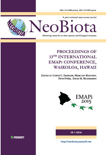
NeoBiota
Scope & Guideline
Advancing ecological scholarship for a sustainable future.
Introduction
Aims and Scopes
- Ecological Impact Assessment:
Research that evaluates the effects of invasive species on native ecosystems, including biodiversity loss, alterations in community structure, and ecosystem functioning. - Management Strategies:
Studies that explore effective management practices for controlling invasive species, including biological control, mechanical removal, and policy frameworks. - Species Distribution Modeling:
Papers utilizing modeling approaches to predict the potential distribution of invasive species under current and future environmental conditions. - Socio-Ecological Interactions:
Investigations into the interactions between invasive species and human communities, including stakeholder perceptions and socio-economic impacts. - Genetic and Molecular Studies:
Research employing genetic analyses to understand the invasion dynamics, hybridization, and ecological consequences of non-native species.
Trending and Emerging
- Climate Change and Invasions:
A growing number of papers are examining how climate change affects the distribution and impact of invasive species, emphasizing the need for adaptive management strategies. - Environmental DNA (eDNA) Applications:
The use of eDNA for monitoring and detecting invasive species is emerging as a significant trend, allowing for non-invasive and efficient assessment methods. - Interdisciplinary Approaches:
There is an increasing integration of social sciences with ecological research, reflecting a trend towards understanding human dimensions in invasion science. - Mechanisms of Invasiveness:
Research focusing on the biological and ecological traits that facilitate invasiveness, such as phenotypic plasticity and genetic diversity, is becoming more prominent. - Management and Policy Implications:
Papers are increasingly addressing the implications of research findings for policy and management practices, highlighting the importance of science-based decision-making.
Declining or Waning
- Historical Reviews of Invasions:
While historical reviews provided foundational knowledge, recent publications have moved towards more dynamic and contemporary studies, focusing on current invasive species and their impacts. - Invasive Species in Agriculture:
Research specifically targeting invasive species within agricultural contexts has seen a decline, possibly due to a shift towards urban and ecological studies. - General Biodiversity Assessments:
Less emphasis on broad biodiversity assessments, as the journal has increasingly favored targeted studies that provide actionable insights into specific invasive species.
Similar Journals

Diversity-Basel
Empowering global collaboration in agricultural and biological sciences.Diversity-Basel is a premier open-access journal published by MDPI, specializing in the vital fields of agricultural, biological, and ecological sciences. Launched in 2009, this multidisciplinary journal, operating from Switzerland, aims to disseminate high-quality research that advances the understanding of biodiversity and ecosystem dynamics. With an impressive impact factor and notable rankings in Scopus, including Q1 classification in Agricultural and Biological Sciences and strong positions in Ecology and Ecological Modeling, Diversity-Basel stands as a valuable resource for global researchers, professionals, and students alike. Its commitment to accessibility enables researchers to reach a wider audience, fostering collaboration and innovation in addressing pressing environmental challenges. By providing an inclusive platform for diverse scientific inquiries and innovations, Diversity-Basel plays an essential role in shaping the discourse on biodiversity conservation and management, encouraging the pursuit of sustainable solutions in our rapidly changing world.
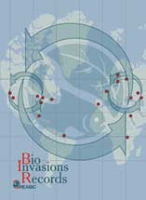
BioInvasions Records
Championing the fight against biological invasions with cutting-edge research.BioInvasions Records is a premier open-access journal dedicated to the study of biological invasions, providing a vital platform for researchers, practitioners, and policy-makers interested in understanding the ecological impacts of invasive species. Published by the Regional Euro-Asian Biological Invasions Centre (REABIC)Ecology, Ecology, Evolution, Behavior and Systematics, currently holding a commendable Q2 quartile ranking in both categories as of 2023. With a notable Scopus rank that places it within the top percentile of its field, BioInvasions Records seeks to foster a comprehensive understanding of the ecological, economic, and social implications of biological invasions from 2012 to 2024 and beyond. The journal's commitment to open access since its inception ensures wide dissemination of research findings to a global audience, facilitating collaboration and innovation in the management of invasive species. Researchers and students alike will find this journal an invaluable resource for advancing knowledge and promoting sustainable practices in biodiversity conservation.
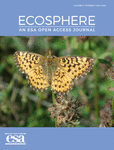
Ecosphere
Exploring the intricate web of life and its systems.Ecosphere is a leading open-access journal published by WILEY, dedicated to advancing research in the fields of ecology, evolution, behavior, and systematics. Established in 2010 and headquartered in the United States, this innovative journal provides a platform for the exchange of cutting-edge scientific knowledge and discovery, fulfilling its mission to enhance our understanding of ecological systems and their interactions. With a prestigious impact factor reflecting its commitment to high-quality research, Ecosphere is ranked Q1 in both Ecology and Ecology, Evolution, Behavior, and Systematics for 2023, further solidifying its prominence in the scientific community. The journal's scope includes a wide array of topics related to environmental science, making it an essential resource for researchers, professionals, and students aiming to stay at the forefront of ecological research. It offers comprehensive open access options, ensuring that groundbreaking findings are readily available to a global audience, thus fostering collaboration and innovation in the field.

Journal of Fish and Wildlife Management
Navigating the future of fish and wildlife conservation.The Journal of Fish and Wildlife Management, published by the U.S. Fish & Wildlife Service, serves as a vital resource for scholars, researchers, and professionals in the fields of Animal Science, Ecology, and Conservation Biology. With its ISSN 1944-687X, this esteemed journal has been disseminating critical research findings since 2010, contributing significantly to the understanding of fish and wildlife conservation practices and their ecological impacts. Despite its Q3 category rankings in various disciplines as of 2023, it provides a platform for innovative research that influences policy and management strategies for biodiversity conservation. The journal, although not open access, remains committed to advancing the scientific discourse surrounding wildlife management with articles that emphasize practical conservation efforts and ecological sustainability. Readers can expect a diverse range of articles that promote best practices in the management and conservation of fish and wildlife resources, furthering our collective mission of preserving ecological health and biodiversity for future generations.

Neotropical Biodiversity
Innovating research to protect our planet's rich biodiversity.Neotropical Biodiversity is a prominent journal dedicated to advancing our understanding of biodiversity and ecological dynamics within the Neotropical region. Published by TAYLOR & FRANCIS LTD in the United Kingdom, this Open Access journal has been providing unrestricted access to research findings since 2015, fostering collaboration and knowledge sharing among the global scientific community. With an emphasis on innovative research in Ecology, Ecology, Evolution, Behavior and Systematics, and Global and Planetary Change, it has earned a reputation for excellence, currently holding a Q3 category in its field. As of 2023, the journal ranks in the 37th percentile for Environmental Science (Ecology) and in the 36th percentile for Agricultural and Biological Sciences (Ecology, Evolution, Behavior and Systematics), making it a valuable resource for researchers, professionals, and students interested in understanding and preserving biodiversity in one of the world's most diverse ecosystems. We invite you to explore the cutting-edge research published in Neotropical Biodiversity and contribute to the ongoing dialogue for environmental sustainability and ecological resilience.

Frontiers in Ecology and Evolution
Empowering discovery in the realms of ecology and evolutionary biology.Frontiers in Ecology and Evolution, published by FRONTIERS MEDIA SA, stands as a premier open-access journal dedicated to the exploration and discourse in the interdisciplinary fields of ecology and evolutionary biology. With its inception in 2013, this journal has rapidly ascended to a prestigious position, securing a Q1 ranking in both Ecology and Ecology, Evolution, Behavior and Systematics categories, reflecting its influential impact in the respective fields. Operative from Switzerland, Frontiers in Ecology and Evolution enables researchers, professionals, and students to access high-quality research without barriers, promoting collaboration and innovation. The journal covers a broad range of topics, from ecological dynamics to evolutionary strategies, facilitating profound insights that drive scientific advancement and understanding. With a remarkable position in Scopus rankings—ranking #218 in Ecology, Evolution, Behavior and Systematics and #145 in Environmental Science—this journal is essential for anyone keen on contributing to or staying updated with contemporary research in ecology and evolution.
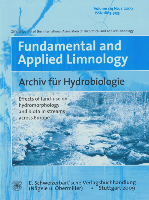
Fundamental and Applied Limnology
Connecting Theory and Practice: Your Resource for Freshwater ResearchFundamental and Applied Limnology is an esteemed academic journal dedicated to the exploration of freshwater ecosystems, bridging the gap between fundamental research and practical applications. Published by E Schweizerbart'sche Verlagsbuchhandlung in Germany, this journal has been a vital resource in the fields of aquatic science and ecology since its inception in 2007. With its ISSN 1863-9135 and E-ISSN 1863-9135, it provides a platform for researchers to disseminate significant findings related to limnology, contributing to a rich understanding of freshwater biodiversity, water quality, and ecological interactions. Although currently rated in the Q3 quartile for aquatic sciences and ecology as per the 2023 rankings, it remains a valuable outlet for interdisciplinary research and practical insights, facilitating critical advancements in environmental management. Open access options enhance its visibility and accessibility, making it indispensable for researchers, professionals, and students alike who are committed to advancing the scholarship in freshwater studies. Engaging with this journal not only opens doors to the latest research findings but also fosters collaboration and innovation in the ecological community.

BIOTA NEOTROPICA
Connecting Scientists to Unravel Nature's MysteriesBIOTA NEOTROPICA is a prominent open access journal dedicated to advancing knowledge in the interdisciplinary field of ecology, evolution, behavior, and systematics. Published by REVISTA BIOTA NEOTROPICA since 2001, this Brazilian journal aims to provide a platform for high-quality research that fosters a deeper understanding of Neotropical biodiversity and its conservation. With an ISSN of 1676-0603 and an E-ISSN of 1676-0611, the journal has established its reputation within academic circles, ranking in the Q3 quartile for Ecology and achieving a respectable percentile of 57 in Scopus’s metrics. Operating from its headquarters in Campinas, SP, Brazil, BIOTA NEOTROPICA not only focuses on research dissemination but also encourages collaboration and exchange of ideas among scientists, students, and professionals in the field. The journal is particularly valuable for those looking to contribute to the understanding of ecological systems and promotes accessibility with its open access model.
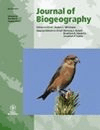
JOURNAL OF BIOGEOGRAPHY
Connecting Research Across Geographic and Ecological FrontiersJOURNAL OF BIOGEOGRAPHY, published by Wiley, stands as a premier multidisciplinary platform for the publication of high-quality research in the fields of biogeography and ecology. With an impressive Q1 ranking in both Ecology and Ecology, Evolution, Behavior and Systematics categories for 2023, this journal is recognized for its significant contribution to understanding ecological patterns and processes across geographic spaces. The journal, which has been in circulation since 1948 with a continuous production from 1979 to 2024, features rigorously peer-reviewed articles, critical reviews, and essential data that illuminate the dynamic interactions between organisms and their environments. While this journal does not currently offer open access options, it remains a valuable resource for researchers, professionals, and students seeking to explore the latest discoveries and theoretical advances in biogeography. With impressive Scopus rankings, including a 73rd position out of 721 in Agricultural and Biological Sciences and a 53rd position out of 461 in Environmental Science, the JOURNAL OF BIOGEOGRAPHY is indispensable for those aiming to advance their understanding of ecological frameworks and biodiversity conservation.

Journal of Wildlife and Biodiversity
Connecting scholars for a greener tomorrow.Journal of Wildlife and Biodiversity, published by Arak University in Iran, is an Open Access journal that has been contributing to the fields of wildlife science and biodiversity since its inception in 2017. With an E-ISSN of 2588-3526, this journal serves as a vital platform for researchers, professionals, and students alike, dedicated to disseminating significant findings related to animal sciences, ecology, and environmental conservation. Despite its current Q4 ranking in various categories (Animal Science, Ecology, and Nature and Landscape Conservation) according to the 2023 metrics, the journal's commitment to advancing knowledge in wildlife and biodiversity remains unwavering. Although the journal's Scopus coverage has been discontinued since 2024, it continues to cater to a wide audience by promoting innovative research and fostering collaborations in the academic community, ultimately aiming to enhance understanding and conservation strategies for wildlife and their habitats.